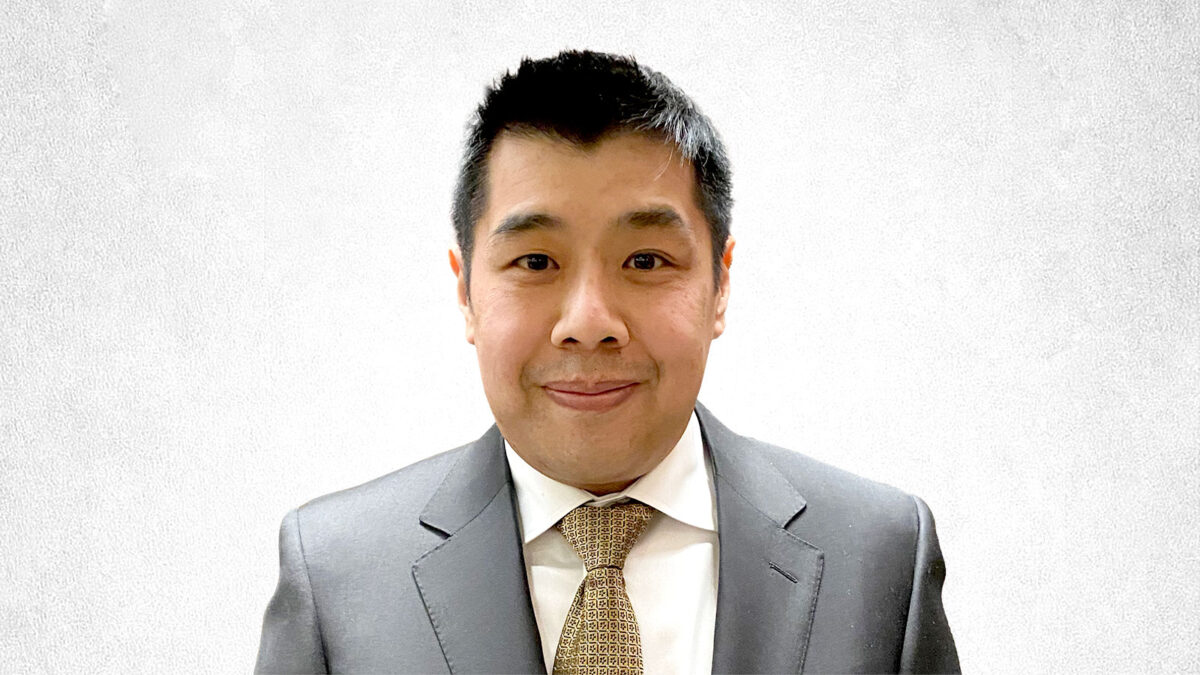
Davis Award Recipient John T. Lee Reflects on a Career Elevated by Community Service
April 2023

Lee, a first assistant attorney general at the Colorado Department of Law in the Criminal Appeals Section, accepts the 2022 Davis Award from DBA President Ruchi Kapoor during at a dinner in his honor. The award is presented annually by Davis Graham & Stubbs LLP, the Denver Bar Association, and the Davis family to a Denver lawyer who is 40 years old or younger and combines excellence as a lawyer with civic, cultural, educational, and charitable leadership.
For this year’s Davis Award winner, John T. Lee, making a positive impact in and out of the courtroom has become the heart of his career. “During my first few years as an attorney, I was very focused on my legal work. Representing crime victims in appellate courts is a weighty responsibility. But fairly early into my career, I was drawn to opportunities to serve the community. The more I did, the greater the urgency I felt to do more. And it was some years later when I realized that I wanted to strive to have an equally significant impact both in and out of the courtroom.”
Throughout his career, Lee has taken on a variety of roles in the community. His first board position was with the Sangre de Cristo Arts Center and Children’s Museum in Pueblo, which Lee calls “the perfect first board experience. It’s an incredibly welcoming and collaborative board all focused on trying to make sure that the Arts Center achieves its mission of making the arts accessible for everyone. It’s been a pleasure to see just how big of a role the Arts Center has on the Pueblo community.”
Lee has also enjoyed serving an administrator for the Denver Bar Association’s Waterman Fund. The Waterman Fund is a charitable trust that provides direct financial support to lessen the burdens of Colorado lawyers experiencing hardship due to age, infirmity, or other incapacitation. “The administrators are a small group of volunteer lawyers who spend their free time trying to assist and honor the noble purpose of the charitable trust. We really get to see the direct impact that the fund has on the people it supports. It’s a unique opportunity to help people who are facing unforeseen difficulties in their lives.”
In light of the last few years, which saw us cut off from each other in dramatic, unprecedented ways, Lee says the pandemic has certainly shown him the importance of being creative in the ways we try to make our communities stronger. “The pandemic took away many of the natural ways we connect with one another. It highlighted for me the need to find different avenues for pursuing community involvement.”
Lee has also been a board member and officer of CBA-CLE, the educational arm of the Colorado and Denver Bar Associations. “I’ve been proud to work with CBA-CLE because they provide such great and comprehensive education to Colorado’s lawyers. The faculty is comprised almost exclusively of volunteers. Having so many of the best lawyers in the state giving up so much of their time to raise the practice level of the profession as a whole is so encouraging.” Lee has a generous approach to teaching, with value for his students at the top of his mind. “My philosophy is that CLEs should be engaging and leave attendees with some new techniques. I try to be very honest about my own experiences and identify places where I feel I’ve grown and try to explain how that happened. I always try to offer at least a few concrete takeaways that attendees can hopefully utilize or consider as they handle their own cases.”
It was another teaching opportunity, working with the Colorado Bar and the Asian Pacific American Bar Association, that provided Lee with a serious introspective opportunity, one that would inspire him to show up for the community in ways he hadn’t before. “I was asked to speak at an event four or so years ago. It was with Justice Liu from the California Supreme Court, and it was centered around having an honest discussion about difficulties some Asians face as they try to break the glass ceiling. It made me really reflect on my career and my role in Colorado’s legal community. It forced me to take a deep dive into whether I was doing as much as I could to make Colorado’s legal community better for everyone.”
Lee continues, “That experience showed me as a general matter, that it’s important to constantly take an honest look at where we are as a profession and to make sure it’s working out the way it should for everyone. But most important, it made me have a real conversation with myself about whether I should be doing more to make our communities more equitable, inclusive, and better for future generations of lawyers.
“That’s one of the reasons I jumped at the chance to co-chair the Diversity, Equity, and Inclusion Impact Team for the Colorado Attorney General’s office.” As Lee explains, “While it’s easy to say that DEI matters, to actually advance it takes a lot of work, vigilance, and accountability. I’m deeply committed to that important work.”
This sort of close awareness and accountability is a hallmark of Lee’s career. Seeking feedback and continued improvement has been essential to him. “Whenever someone new reads one of my briefs or sees me argue, I try to get as much feedback as I can. Although I’ve written approximately 700 briefs and done over a hundred arguments, I still get helpful feedback every time.”
It is one of several habits Lee recommends to new attorneys. “I tell new attorneys to really think deeply about what kind of attorney they hope to be, the multitude of dimensions that should entail, and the importance of building habits around trying to bring that vision to fruition. The most important habits are those that facilitate continued improvement. The first few years in one’s legal career go fast. Having strong built-in practices that maintain the high quality of one’s work while also encouraging constant growth can make a real difference.”
Lee attended Georgetown Law School in Washington, DC, where he was surprised to find himself drawn to appellate law. “While I never would have guessed at the time I’d become an appellate lawyer, looking back, there were definite indications throughout law school. Although I had never seen an oral argument or moot court competition before, I made the moot court team. When I had spare time, I used to get up early and wait in line to see SCOTUS arguments. During my third year, I took a year-long appellate practice class. I got to work on an active DC Circuit Court of Appeals patent case litigating the patent covering the first pacemaker. I found working on the case incredibly engaging. Looking back, that was my favorite and most challenging class.
Lee pinpoints that experience, especially how much he enjoyed writing that brief, as when it clicked for him that appellate practice was what he wanted to do. “I enjoy that there are so many components that come together to make an effective brief. And what makes an effective brief varies from case to case. In rare cases, facts matter most. In some cases, policy concerns will control the day. In others, it might be finding a hole in precedent, seeing a new legal angle, or just explaining why a settled rule of law remains the right standard. Of course, in many cases, it’s a mix of those different aspects.
“In addition to getting to write briefs, one of the best parts of appellate practice to me is oral arguments. There is something very unique and special about getting the chance to answer any questions or concerns the judges or justices may have and getting a last chance to try to convince them about your position. And given that you are either arguing in front of three court of appeals judges or seven Supreme Court justices, having to manage different perspectives and concerns presents an extra challenge in addition to the time constraints.”
When asked why he enjoys handling high-profile cases in particular, Lee cites the challenge and the potential for positive impact. “It’s been one of the highlights of my career thus far to have been trusted to work on a number of high-profile cases.
“High-profile cases are normally high profile because they carry potentially big consequences or involve novel issues. It’s fun working on cases that can impact not just the parties, but potentially future cases should they result in precedent. I like working on cases that require thinking about how to win a case while balancing how to craft the law in ways that will lead to better outcomes in future cases as well.”
Lee’s answer is perfectly in keeping with a career dedicated to making the community a better place for those around him. The CBA commends this young civic leader for his commitment to serving the public and congratulates him for being named this year’s Davis Award recipient.
“I tell new attorneys to really think deeply about what kind of attorney they hope to be, the multitude of dimensions that should entail, and the importance of building habits around trying to bring that vision to fruition. The most important habits are those that facilitate continued improvement.”


